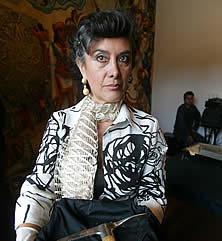 |
 |
 |
 News Around the Republic of Mexico | July 2005 News Around the Republic of Mexico | July 2005  
Icepick Used to Kill Leon Trotsky Resurfaces After Six Decades in Mexico
 Mark Stevenson - Associated Press Mark Stevenson - Associated Press


| Ana Alicia Salas shows the icepick that was used almost 65 years ago to kill Leon Trotsky in Mexico City.
(Photo: AP) |
Mexico City – One of history's most infamous murder weapons, the icepick used to kill Russian revolutionary Leon Trotsky, has resurfaced after being lost for decades, just weeks before the 65th anniversary of his Aug. 20, 1940, assassination.

But tests that could prove the weapon's authenticity have been delayed by a dispute between the icepick's owner, who is shopping it around, and Trotsky's descendants, who want it donated to a revolutionary museum – proving that the struggle between socialist ideals and capitalism still goes on.

The icepick is now in the possession of Ana Alicia Salas, whose father apparently removed it from an evidence room while serving as a secret police commander in the 1940s. She is toying with the idea of selling the foot-long, sawed-off ice ax, though she says she hasn't decided how much it's worth.

Just a few blocks away, Trotsky's grandson, who keeps the revolutionary flame alive by maintaining Trotsky's home as a museum, says he wants the pick.

Trotsky helped lead the 1917 Russian revolution, but split with dictator Josef Stalin and fled to Mexico in 1937, accusing Stalin of having betrayed the revolution.

Stalin is widely believed to have arranged Trotsky's murder, in which a young man posing as a sympathizer sneaked up behind Trotsky and sank the ice pick into his skull.

The murder weapon has become infamous, inspiring even the indie rock band "Trotsky Icepick," whose songs included "A Little Push At The Top Of The Stairs" before they stopped recording in the mid-1990s.

The weapon in Salas' possession still has faint, reddish-brown stains visible on its gleaming surface. But there's only one sure way to prove whether those stains are Trotsky's blood, and Esteban Volkov, Trotsky's grandson, holds the key: his DNA.

"Looking at it objectively, this is a piece of history," Volkov said in an interview at the home in the leafy Mexico City district of Coyoacan where Trotsky was killed, just blocks from where Salas, the icepick owner, also spoke to The Associated Press. "It should be in the museum."

Volkov, 79, has offered to give a sample of his own DNA for comparison to whatever material can be recovered from the pick, but only on the condition that Salas donate the artifact to the Trotsky museum here.

"If it is for commercial purposes, I refuse to participate in this kind of thing," Volkov said with a disdain echoed in the volumes of Trotsky's revolutionary writings on display in the museum's library.

Salas, 50, refuses to consider such a donation, saying people only value the things they pay for.

"Sometimes people don't value things that are given away," Salas said.

In a country where police misconduct is legendary, Salas is quick to paint her father, Alfredo Salas, as a model secret service agent.

She said that Alfredo Salas, who retired in 1965 and died in 1985, had been granted permission by superiors to keep the icepick in order to put together a "museum of criminology."

He withdrew the pick from the museum and kept it among his personal possessions after someone tried to steal the artifact from a criminology display.

While she has said in the past that she is seeking "some financial benefit" in exchange for the pick, she hedges when asked if she is selling the piece.

"I think this instrument is valuable. It is a piece of world history," Salas said as she displayed the pick, wrapped in flannel and kept in an old cardboard box labeled "Kenmore Electric Heating Pad."

Asked how much she thinks it is worth, she says "I don't know, because I don't know who's interested in it."

For Volkov, the dispute over whether the murder weapon should be sold or donated echoes the same battle Trotsky fought all his life.

"Marxism is still valid, and present," he acknowledged with a chuckle, "though we do live in a market economy." | 
 | |
 |



